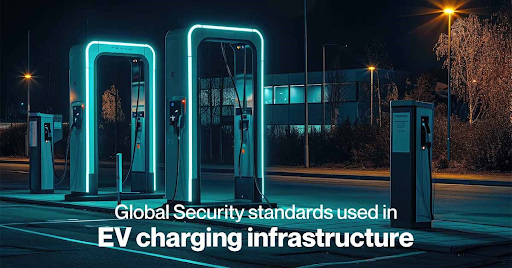
The security of Electric Vehicle (EV) charging infrastructure is critical due to the interaction between EVs, charging stations (EVSEs), backend systems, and the grid. Several security standards and best practices have been established to ensure the safety, privacy, and integrity of these systems. Below are key security standards and frameworks relevant to EV charging infrastructure:
1. ISO 15118 – Vehicle-to-Grid Communication Interface
- Scope: Secure communication between EV and EVSE (charging station).
- Key Features:
- Plug & Charge (automated authentication and billing).
- TLS encryption for data security.
- Digital certificates for mutual authentication.
- Supports bidirectional charging (V2G).
2. IEC 63110 – Protocol for Charging Management
- Scope: Communication between Charging Station Management Systems (CSMS) and EVSE.
- Security Provisions:
- Cybersecurity controls at the network, transport, and application layers.
- Integration with Public Key Infrastructure (PKI).
3. IEC 61850 (used in Smart Grids, applicable to EVs)
- Scope: Communication within smart grid systems, including DERs and EVs.
- Security Aspects:
- Secure messaging.
- Role-based access control (RBAC).
- Audit trails.
4. OCPP (Open Charge Point Protocol) – Typically v2.0.1 or newer
- Scope: Open standard for communication between EVSE and backend systems.
- Security Features (from v2.0 onwards):
- TLS encryption.
- Centralized certificate management.
- Secure firmware updates.
- Event logging and auditing.
5. NIST Cybersecurity Framework (CSF) & NIST IR 7628
- Scope: Broader cybersecurity framework, adopted in EV charging contexts.
- Security Domains:
- Identify, Protect, Detect, Respond, and Recover.
- Critical for utility providers and operators of charging networks.
6. ISO 27001 – Information Security Management System (ISMS)
- Scope: Applied to backend systems managing EVSE networks.
- Focus: Governance, risk management, and compliance for IT systems.
7. TLS/SSL and PKI (Underlying technologies)
- Usage: Secure all communications (EV↔EVSE, EVSE↔backend).
- Includes:
- Mutual authentication.
- Data confidentiality and integrity.
Other Considerations
-
- Firmware signing and secure boot for charging stations.
- Physical security for chargers (e.g., tamper detection).
- User privacy (e.g., GDPR compliance for billing and location data).
- Over-the-Air (OTA) update security for software/firmware.
Summary Table
| Standard | Focus Area | Key Security Feature |
|---|---|---|
| ISO 15118 | EV ↔ Charger | TLS, digital certificates, Plug & Charge |
| IEC 63110 | Charger ↔ Management System | PKI, cybersecurity policies |
| OCPP 2.0.1+ | Charger ↔ Backend | TLS, logging, secure updates |
| ISO/IEC 27001 | Information Management | ISMS governance |
| NIST CSF | Risk Management | Identification, protection, detection |
Sunstream’s embedded development services team has good experience in these standards and has supported leading companies to implement these standards.




 +1.585.935.7123
+1.585.935.7123 +91-804-148-6861
+91-804-148-6861